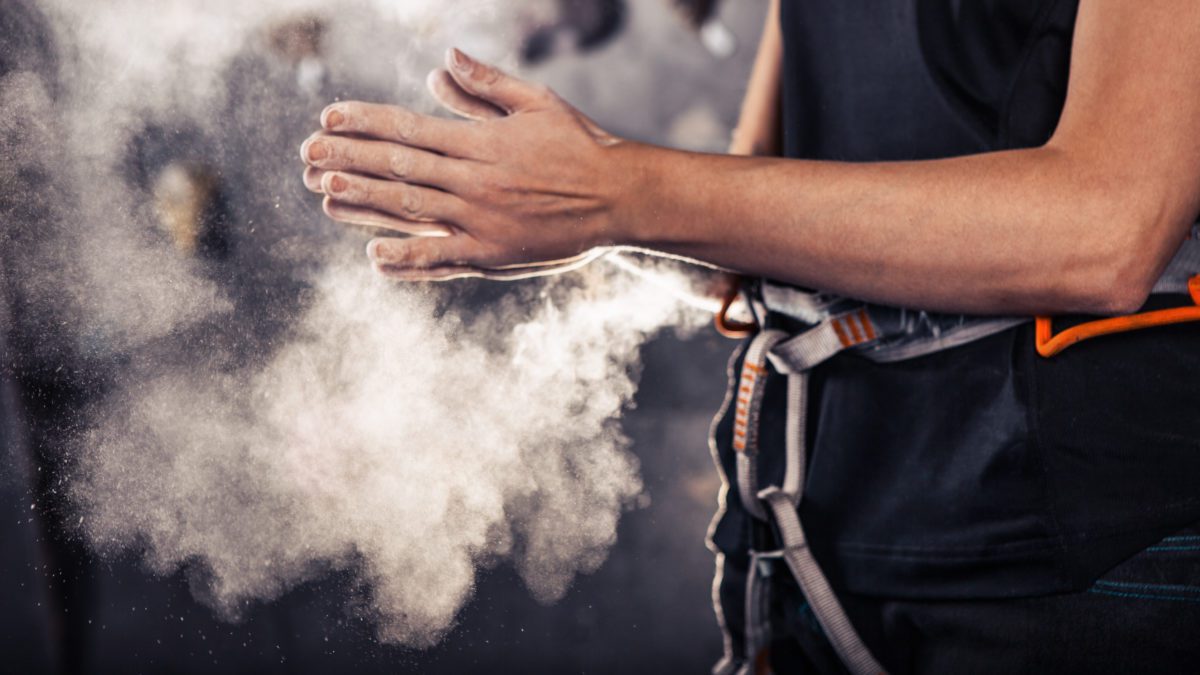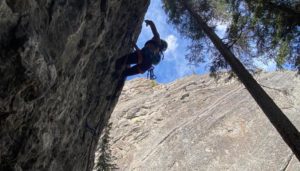Climbing Chalk and Covid-19: Infectious Particles Reduced by Over 99%
De Montfort University has published an update regarding their recent study on climbing chalk and the relative deactivation of coronavirus on chalked, plastic surfaces

These last two months have seen climbing gyms scramble in their efforts to return safely to business. Among their changes, gyms have begun to implement mask-on policies, no-loose-chalk policies, and have placed restrictions on the number of people allowed in a facility at a time.
Among the greatest concerns for gym goers and owners alike is the question of what to do about chalk. For decades, loose climbing chalk has been a staple of the sport and climbers are understandably hesitant to do away with it. At the same time, loose chalk can seem like a hazard amid the coronavirus pandemic due to the fact that it is frequently suspended in the air. What happens when people inhale another person’s chalk? What happens when you touch someone else’s chalk on climbing holds? Can chalk transmit the virus?
According to new research by scientists at De Montfort University Leicester (DMU), “Climbing wall chalk should not be considered a risk in the transmission of viruses like COVID-19.”
“In the first study of its kind, virologist Dr Maitreyi Shivkumar worked alongside microbiologist Dr Katie Laird and postdoctoral researcher Dr Lucy Owen to assess whether coronavirus can survive in climbing chalk and if it remains infectious to people.”
To complete the experiment, the researchers dusted dry plastic surfaces with magnesium carbonate, calcium carbonate, or a combination of the two before adding droplets of a model coronavirus called HCoV-OC43, which has a very similar structure and survival pattern to the SARS-CoV2 virus. With that said, the researchers were not able to test the SARS-CoV2 virus specifically. This is significant as it is the latter of the two viruses that causes COVID-19.
Over the course of an hour, the researchers recovered the virus at several intervals to inspect the number of infectious particles still present.
According to their study, “The results showed that within just one minute of the virus coming into contact with the chalk, the number of infectious particles in all of the samples was reduced by more than 99%.”
Dr. Shivkumar said, “We are really pleased that the findings of our study suggest that chalk powder inactivates the infectivity of the virus and is therefore unlikely to harbour coronaviruses like SARS-CoV-2.”
The research paper following this study is currently in the process of being finalised. It will hopefully by published by the end of the year following peer review. The peer review process is significant as it will confirm, by consensus, the research process as a legitimate explanation of these researchers’ findings.
The head of the Infectious Disease Research Group at DMU, Dr. Laird said, “As far as we know there is no other research looking at the survival of coronavirus in climbing chalk. The paper will hopefully be published in the coming months but we felt it was important to highlight the positive results now, to offer reassurance to those who want to get back to climbing safely.”
Rich Emerson, Chair of the ABC (Association of British Climbing Walls), said, “It looks like chalk is a friend and not a foe and this should provide some comfort to any customers who are worried that chalk could harbour the virus. We look forward to the peer review and publication of the study which we know are critical parts of this work.”
“It’s also really important that climbing walls do not slow down with their COVID-safe social distancing and hygiene measures that have been agreed with the different UK Government Departments. “
“I hope that this pioneering work by DMU will encourage others to conduct their own research into chalk and virus infectivity.”
You can read the entire piece here. In the meantime, climbers will look to their local governments and communities for guidance in the developing pandemic. This study comes at as a great bolster to the Friction Labs publication earlier this summer. That piece, covering the world’s first Hygienic chalk, can be found here.


